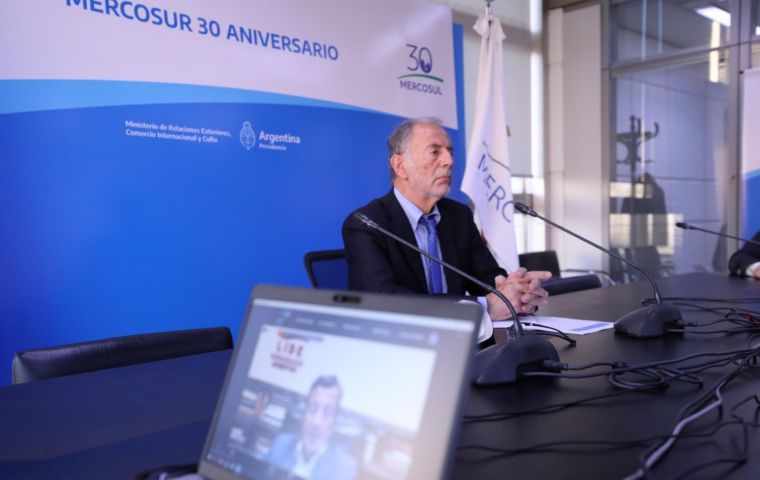MercoPress. South Atlantic News Agency
Argentina still resists drive to make Mercosur more flexible
 “It is necessary to strengthen ourselves as a bloc and not think about individual exits,” said Neme
“It is necessary to strengthen ourselves as a bloc and not think about individual exits,” said Neme A top official from the Argentine Government spoke yet again against a bid from Brazil and Uruguay to make Mercosur more flexible and allow members to broker one-on-one deals with other countries or blocs.
“We do not share the position that each country begins negotiations individually,” said Argentina's Secretary of Economic Relations, Jorge Neme, in statements during a business meeting.
Easing the rules for trade negotiations and a possible reduction of the common external tariff (CET) of the bloc made up of Argentina, Brazil, Paraguay and Uruguay dominate the Mercosur agenda to be discussed by foreign ministers of the four countries next Tuesday in Buenos Aires.
Neme added that “Mercosur's strength lies in a joint international projection, which gives it greater negotiating capacity,” where partners can “obtain greater advantages.”
He also pointed out that “it is key to think that for the reconstruction of the social and productive fabric it is necessary to strengthen ourselves as a bloc and not think about individual exits.”
The governments of Uruguay and Brazil have been raising the need to allow Mercosur member countries to broker trade deals with other markets independently and not as a bloc. But Argentina, which this semester holds the presidency of the bloc, insists on negotiating together, with a united Mercosur, as marked by the Treaty of Asunción, the founding document of Mercosur.
“Mercosur has to be backed by Article 1 of the Treaty of Asunción, which states that negotiations with third countries and regional blocs are carried out jointly,” said Neme, although he agreed that the bloc needs to connect “more intensely with the world.”
But Neme added that “this connection is not an indiscriminate and innocent opening, but a round trip, of creative dialogue with the rest of the regions and countries, and for this Mercosur is the ideal platform.“
Neme also said that the Mercosur partners were trying to overcome their differences regarding a possible downgrade of the bloc's CET, whose review process began two years ago. The Mercosur CET is a maximum of 35%, but the applied average is 12%, compared to a global average of 5.5%.
Both Uruguay and Brazil promote a substantial and broad tariff reduction, but Argentina submitted last April a proposal for more moderate and selective cuts that do not affect national manufactures without the ability to compete with imports from other markets. In this regard, Neme pointed out that Argentina's initial proposal reached 25% of the common Mercosur nomenclator, the universe of merchandise traded by the bloc, but that it later expanded it to 75%.
But ”Argentina chose not to affect final goods“ and ”safeguard the competitiveness“ of its industrial sector ”so as not to affect the most sensitive sectors,“ explained Neme. ”We believe that progress can be made within this framework,” he added.




Top Comments
Disclaimer & comment rulesCommenting for this story is now closed.
If you have a Facebook account, become a fan and comment on our Facebook Page!